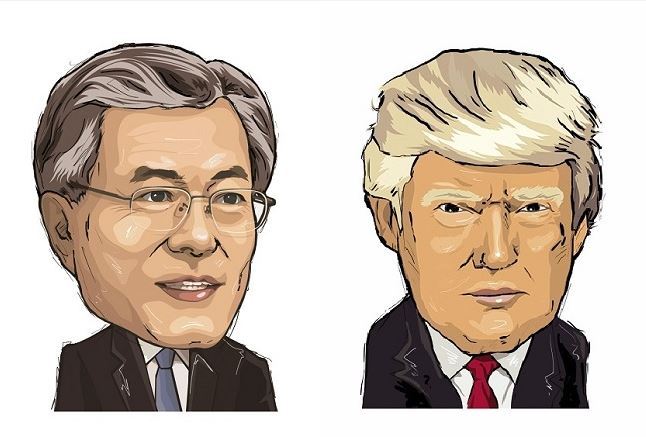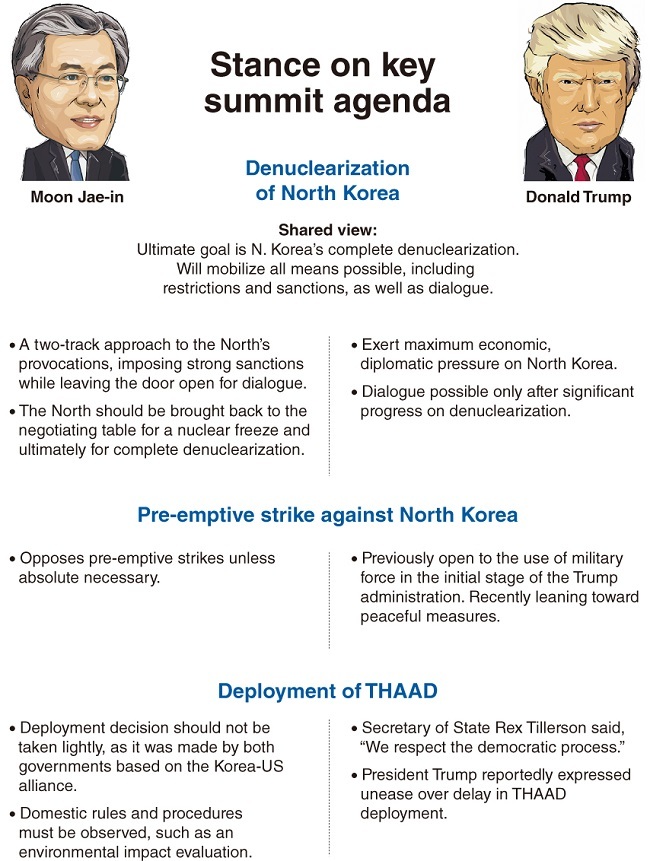South Korean President Moon Jae-in’s first summit meeting with US President Donald Trump, scheduled for Friday, comes at a time laden with difficult issues.
To name a few, North Korea continues to defy the international community by forging ahead with nuclear and missile programs, which some experts say could soon pose a threat to the continental US. There is also Trump’s “America First” drive, which would bring a host of issues into question, ranging from the Korea-US FTA to the US’ defense expenditure in Korea.

Officially, according to Seoul’s presidential office, Moon’s visit aims to strengthen the two countries’ alliance and better cooperate in pressuring North Korea.
According to Cheong Wa Dae, the leaders will discuss a range of issues including ways to strengthen the alliance and come up with a fundamental solution to Pyongyang’s nuclear ambitions.
The deployment of the US’ Terminal High Altitude Area Defense anti-missile system, though a thorny and ongoing issue, is not on the official agenda, Cheong Wa Dae said.
However, recent developments suggest that the subject may not be so easily passed over.
As revealed by CIA Director Mike Pompeo in a recent interview, North Korea weighs heavily on the mind of the US president. In an interview with MSNBC, Pompeo said that Trump enquires about the North Korean threat and Washington’s countermeasures on a daily basis. The death of US student Otto Warmbier and Pyongyang’s provocations since Moon took office on May 10 are likely to have pushed North Korea-related issues further up the US’ priorities.

A letter issued by US senators on Friday to Trump urged the full deployment of THAAD, stacking the odds against the issue going unmentioned during the upcoming summit.
Led by Sens. Cory Gardner and Bob Menendez, a total of 18 senators requested Trump to use the summit to expedite the full deployment of the THAAD missile defense system.
“You and President Moon should seek a way to expedite the procedural review that is currently hindering the full deployment of the Terminal High Altitude Area Defense system,” the senators said in the letter.
“We ask you to reiterate to President Moon that the decision to deploy THAAD was an alliance decision, and protects both US troops and millions of South Korean citizens, while not posing any threat to South Korea’s neighbors.”
The senators also called on Trump to condemn China’s “unprecedented campaign of economic and political retaliation” over THAAD, in an apparent attempt to ease Seoul’s concerns over Beijing’s actions, which have dealt a severe blow to Korean businesses operating in China.
As for the Korea-US FTA, the US president has referred to the deal as “horrible,” a disaster and an agreement which his administration would seek to renegotiate or terminate.
According to the Office of the US Trade Representative, US goods trade deficit with South Korea came to $27.7 billion last year. In addition, the US Department of Commerce is set to release a report on South Korea and 15 other countries the US is recording trade deficits with.
In an attempt to redress the imbalance, South Korean government is reportedly considering increasing fuel and arms imports from the US.
Unnamed officials from Seoul’s finance and industry ministries have been quoted by the local media as saying that the government may suggest a possible increase in US arms and shale gas imports during Moon’s visit.
The timing of the reports have added to speculations that Seoul is wary of the US leader’s stance on bilateral trade. The reports followed on the heels of the news that South Korea’s Deputy Prime Minister of Economy Kim Dong-yeon emphasized Seoul’s efforts to address the Korea-US trade imbalance in a phone conversation with US Secretary of Treasury Steven Mnuchin.
Despite such developments, Seoul appears set on keeping the summit focused on the big picture, with Moon reiterating such plans.
“President Moon said that he would concentrate on building trust and friendship with President Trump, rather than focusing on obtaining results (on specific issues),” Cheong Wa Dae spokesman Park soo-hyun said Monday.
Park’s statement has been repeated by high-level presidential aides, with some saying that Moon and Trump building personal relations would be great results in itself.
According to Park, the former ambassadors to the US who met with Moon on Monday advised the same. At the meeting, the former diplomats suggested that Moon should focus on “highlighting the importance of the alliance and strengthening its foundations,” Park relayed in a briefing.
Moon’s schedule appears tailored to the goals Cheong Wa Dae has stated. Moon kicks off his five-day trip with a visit to a monument dedicated to US soldiers who fought in the Battle of Chosin Reservoir of the 1950-53 Korean War. He is to visit another war memorial in the morning of Friday’s summit. The Battle of Chosin Reservoir is considered one of the fiercest of the three-year conflict. It enabled the evacuation of civilians, including Moon’s parents, from the North Korean city of Hungnam.
By Choi He-suk (
cheesuk@heraldcorp.com)






![[Exclusive] Hyundai Mobis eyes closer ties with BYD](http://res.heraldm.com/phpwas/restmb_idxmake.php?idx=644&simg=/content/image/2024/11/25/20241125050044_0.jpg)
![[Herald Review] 'Gangnam B-Side' combines social realism with masterful suspense, performance](http://res.heraldm.com/phpwas/restmb_idxmake.php?idx=644&simg=/content/image/2024/11/25/20241125050072_0.jpg)

